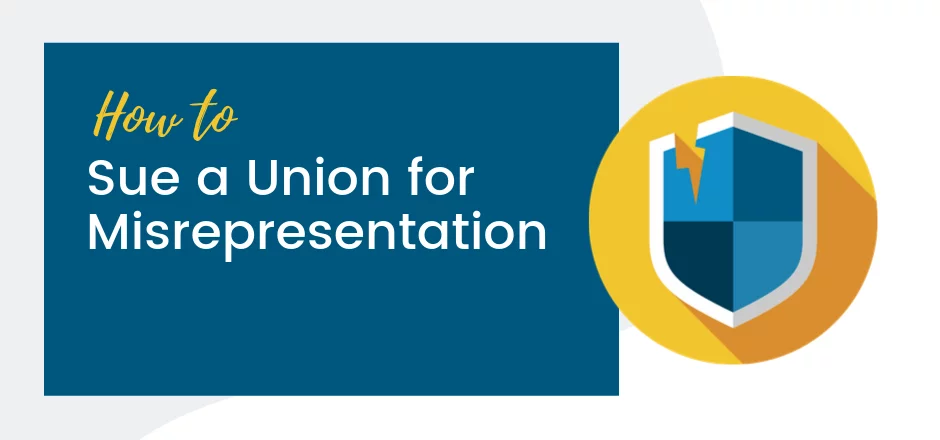How to Sue a Union for Misrepresentation
A labor union is an organization that represents workers in a variety of industries in the United States. They act on behalf of the worker to negotiate wages, benefits, and working conditions for the members they represent. In some cases, workers may feel the union failed to properly represent their members and may consider the idea of filing a lawsuit against the union.
In this article, we’ll take a closer look at how to sue a union for misrepresentation.
How to Sue a Union for Misrepresentation
In the state of California, unions owe a duty of fair representation to the people they represent. Representatives must act fairly, equitably, and without discrimination when taking action on behalf of members, including the negotiating of contracts and the settling of official grievances or complaints.
If your union fails to represent you in a fair fashion, you may be wondering how to sue a union for misrepresentation. You should know that such an action is an extreme last resort in a very complex process, rather than the standard procedure.
Related: Find a Los Angeles Employment Lawyer
Before you can sue, you must file a claim with the National Labor Relations Board (NLRB) and/or federal courts to prove that the union failed in their duty of representation. Only after the court or NLRB approves your claim can you move forward with a civil suit.
The vast majority of cases against unions never reach the civil court. Still, if you believe you have been treated unfairly or discriminated against, you may have the right case conditions to support a possible lawsuit. Here’s what you need to know.
Here’s how to sue a union for misrepresentation.
How Unions Fail in their Duty of Representation
Unions can fail in their duty of fair representation if they act in bad faith, make arbitrary decisions, or discriminate. While this may seem straightforward, there is a considerable amount of grey area involved. This can make it extremely difficult to determine whether a union actually crossed the line.
Another complication is the fact that the law does not require that unions agree to handle all grievances. While they are required to at least consider and investigate your claim, they do have the right to decline if they feel your case isn’t strong enough to go anywhere.
They just can’t say no on the basis of the aforementioned issues.
Examples:
- A union who refuses to file grievances for all black persons of color. This is clear discrimination and counts as misrepresentation.
- A union who refuses to pursue your grievances despite recently pursuing an almost identical grievance for someone else. This is acting arbitrarily.
- A union who refuses to file your grievance because they do not like you personally. This is acting in bad faith.
- A union who refuses to pursue claims brought forth by pregnant women (e.g., unsafe working conditions). The U.S. Equal Employment Opportunity Commission (EEOC) qualifies this as discrimination on the basis of sex.
What to Do First Before Filing Your Suit
If you’ve read the information above, yet still believe your union crossed the line by failing in their duty of representation, you have some legwork ahead of you.
First, most experts recommend that you start by trying to work the issue out with the union itself. If your representative will not hear your grievance, seek out a leader in a position of power (e.g., a union officer) and share your concerns with them. You may find that a person is willing to pursue your grievance for you.
You can also try suggesting steps or investigation methods to the union representative, especially if it seems like they aren’t sure how to proceed. For example, you might say “please have someone inspect the warehouse floor for dangerous uneven spots.” This may be enough to push them into action.
If all else fails, and you truly believe you have been treated unfairly, it’s time to file a claim with the NLRB. Employees working at private businesses can handle this process at the nearest NLRB office; government employees must file through the California Public Employees Relations Board. This process is free, but it is time-limited to six months after you exhaust other options.
If Your Claim Involves Discrimination
If you claim the union failed to represent you fairly on the basis of a protected class (sex, race, gender, religion, or disability), you must also file a charge with the EEOC.
First, gather as much information and evidence as you can. Write down everything you can remember about the experience, including names, dates, times, and other critical information. If you have witness info, include both the name and contact info for the witness as well as a personally-written and signed account of events.
Next, notify the union representative who specifically handles discrimination complaints that you intend to file a charge with the EEOC. If you aren’t comfortable with this for a specific reason (e.g, that person discriminated against you), you have the option to skip this step – just include an explanation when you submit your charge.
If the EEOC agrees to review your charge, you will need to follow their in-house process for filing claims. For more information on this, contact your nearest office.
Work with an Employment Attorney
If the EEOC and NLRB agree that you have been treated unfairly, one or both will provide you with a right-to-sue letter. This document empowers you to begin the process of officially suing the union.
If you haven’t done so already, it is absolutely imperative to consult with a lawyer before you file with the courts. Unions often have very robust legal teams and far more resources than the average individual. It is remarkably easy for them to deny any wrongdoing and effectively win their case on a technicality, especially if you try to self-represent and don’t fully understand the laws. Finding an expert who specializes in employment law is the best way to protect yourself and assure a win.
Your attorney will help you gather information and organize it into an official complaint. Once you both agree on the contents, he or she will file it with the federal district court and officially initiate your lawsuit. This process comes with a $400 fee.
After Filing Your Lawsuit
Once your attorney files a lawsuit with the courts, you are required to serve the union with notice. Generally, this is handled by hiring an off-duty U.S. marshal to bring the document to the union’s legal team directly. You may also self-deliver notice on your own if you are comfortable doing so.
The federal district court grants unions a certain amount of time to respond to or deny the claims made within your lawsuit. Assuming the union doesn’t immediately offer you a settlement, they will likely file a motion to dismiss, which will eventually lead to an official hearing of evidence in the courts. As long as the evidence is clear and your attorney is skilled enough to overcome their arguments, the judge will set an official date for trial and your case will proceed.
A significant amount of time may pass between your initial hearing and the date of your trial. Use this time to work with your attorney to discover evidence, file any necessary disclosures, and get prepared for court. You may need to oppose any summary judgment motions filed by the union, should they attempt to have the case dismissed. Or, you may be offered a settlement; do not accept without your lawyer’s approval in any circumstances.
If your case proceeds to trial, a judge will hear the details. Both lawyers will have the opportunity to cross-examine witnesses and make their own arguments. Once all information is presented, the judge will deliberate and reach a decision – hopefully in your favor.
Are you in search for a certified attorney to represent you?
Let us help you find one today!



